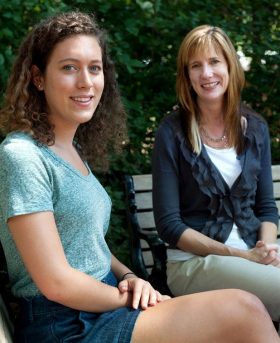Professor of Human Service Studies Cindy Fair spent a yearlong sabbatical studying reproduction decisions by young adults born with HIV.

By Kristin Simonetti ’05
On a quiet morning a few days after Commencement, Cindy Fair found herself in a place she hadn’t spent much time in the past few months: her office on the second floor of Alamance Building.
The professor of human service studies returned in May after spending a yearlong sabbatical studying the fertility desires and intentions of youth living with perinatal HIV infection – or, put more simply, whether young adults born with HIV want to or expect to have children.
“Because of the advances in medicine, children who were born with HIV in the 1980s and ’90s and weren’t expected to live past age 2 are now reaching their 30s,” Fair explains. But support for the psychosocial effects the disease has on patients and their families hasn’t exactly kept pace with technology.
“They’re asking questions about how to navigate relationships, about whether they want to or should have children,” Fair continues. “They need the knowledge and tools to manage the disease in this new phase of life.”
Some of the problems facing these young people are systemic. Many adolescents with maternally transmitted HIV have received care via Medicaid, but that often ends at age 18 unless the person enrolls in college or has private insurance. Other problems are more personal. Adolescents born with HIV often develop strong bonds with their pediatricians over several years and find it difficult to forge comparable rapport with their physicians in the adult clinic.
As a result, many patients are falling out of treatment altogether, which could turn back the clock on the progress that’s been made in bringing HIV/AIDS under control in the United States.

Using her professional connections with local agencies, the National Institutes of Health and Duke University Medical Center, where she served as a clinical social worker and researcher for five years in the late 1990s, Fair spent hundreds of hours in the past year studying young adults with HIV, their families and medical providers via interviews, focus groups and surveys.
She’s found that a patient’s level of disease knowledge is directly related to the quality of their interaction with their doctors; that a creative writing therapy group is an effective, low-cost means of helping teens with HIV become comfortable talking about the disease; that the overwhelming majority of young adults with HIV intend to have children; and that providers aren’t informing teens considering motherhood about the proper ways to ensure they don’t pass HIV on to their children.
“In the early 1990s, before treatments were approved, mothers with a high viral load had a 30 percent chance of passing the virus to their children. Now, with treatment and education about how to interrupt maternal transmission of the disease, mothers have less than a 1 percent chance of passing HIV on to their children,” Fair says. “But our research found that few patients were being asked by providers, ‘Do you want to have a child?’ or ‘Do you know that you can have a healthy child?’”
Fair’s scholarship attracts Elon’s best and brightest students. She has mentored nearly two dozen undergraduate research projects since arriving in 1999, and those relationships have not only produced presentations and publications, but also professionals contributing to the field of HIV/AIDS care. Two of Fair’s most recent mentees, Lauren Taylor ’10 and Jamie Albright ’13, received the Lumen Prize, Elon’s premier award to support and celebrate academic research and creative achievement.
“They keep me on my toes, organized and busy – especially this past year I’ve been on sabbatical,” she says. “It’s like going to the gym with a friend. It’s a lot easier to go when you’ve got someone else to go with you and hold you accountable.”
These research relationships offer Fair the chance to keep a toe in the pool of social work. Despite spending more than a decade in academia, she still feels a strong pull toward the immediate impact of clinical care. She thinks of her scholarship as “research as intervention;” though she’s not providing direct care to the people she works with, she’s able to offer them an opportunity to make positive change in their lives.
“I’ll speak with someone who’s never told their story before, and they’ll tell me things they wouldn’t even tell their families,” Fair says. “It’s very meaningful, very powerful for them to have their story listened to. It gives me goosebumps just thinking about it.”
A longer version of this story appeared in the Summer 2012 edition of The Magazine of Elon.


